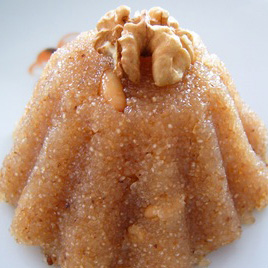
AYURVEDIC FOODS
Table of Contents
|
INCREASES Increases These Biocharacteristics (Gunas)
Functional Ayurveda helps you assess imbalances through 20 main biocharacteristics
(gunas).
Aggravating these characteristics weakens your body and causes imbalance.
By knowing which characteristics are habitually imbalanced in your body, you will be able to identify and correct imbalances before you get sick.
Every characteristic has an opposite which balances it (i.e. hot balances cold).
You restore balance by favoring diet and lifestyle choices that increase the opposite characteristic.
| COLD ABOUT COLD BIOCHARACTERISTICCold refers to anything that reduces body temperature, metabolism, and blood flow.GOOEY ABOUT GOOEY BIOCHARACTERISTICGooey is identified by anything gelatinous (such as oatmeal), or by mucus congestion. |
TASTES The 6 Tastes
Taste is used to sense the most basic properties and effects of food.
Each taste has a specific medicinal effect on your body.
Cravings for food with certain tastes indicate your body is craving specific medicinal results from food.
Taste is experienced on the tongue and represents your body's reaction to foods.
Sweet taste causes physical satisfaction and attraction whereas bitter taste causes discomfort and aversion.
Kapha should use less sweet taste while Vata and Pitta would benefit from using more sweet taste.
One of the first signs of illness is that your taste and appetite for food changes.
The six tastes are sweet, sour, salty, pungent, bitter, and astringent.
Do you crave foods with any of the tastes below?
| SWEET ABOUT SWEET BIOCHARACTERISTICSweet refers to anything builds tissue, including macronutrients such as carbohydrates, proteins and fats. |
DOSHAS The Three Doshas / Body Types
According to the biocharacteristic theory of medicine,
people tend to get sick, over and over again, due to habitual causes and imbalances that are unique to the person.
Your body type summarizes this tendency, showing you the 'type' of conditions and imbalances that frequently challenge your health & wellness.
Using body type, you can also identify remedies likely to improve your strength and resiliency.
Your body type identifies physical and mental characteristics as well as your personal strengths and weaknesses.
The calculation of your body type is based on your medical history.
The 3 functional body types (doshas), are Catabolic (Vata), Metabolic (Pitta), and Anabolic (Kapha). Catabolic individuals tend to break down body mass into energy. They are easily stimulated, hyperactive, underweight and dry. Metabolic individuals tend to burn or use energy. They tend to be rosy-cheeked, easily irritated, focused, driven, and easily inflamed. Anabolic individuals tend to store energy as body mass. If they store too much energy, they could gain weight easily and have congestion. Anabolic people tend to be stable and grounded. | |
HERBAL ACTIONS (see all) |
Medicinal Benefits, Uses & Herbal Actions of Sucanat  Experiences are Personal
Experiences vary according to the person and constitution. Individual results may vary.
The list of herbal-actions below has not be approved by the FDA and should not be used to treat a medical condition.NUTRITIVEAn herb that is strengthening and nourishing. |
Foods with a Similar Nature to Sucanat
Vegetable Stock has these Actions in Common
NutritiveMiso has these Actions in Common
NutritiveDates (soaked) has these Actions in Common
NutritiveApricot (fresh) has these Actions in Common
NutritiveKiwi has these Actions in Common
NutritiveRice Flour has these Actions in Common
NutritiveGoat Milk has these Actions in Common
NutritiveMaple Syrup has these Actions in Common
NutritiveBone Broth has these Actions in Common
NutritiveSkim Milk Powder has these Actions in Common
NutritiveHerb Supplements with a Similar Nature to Sucanat
Cordyceps has these Actions in Common
NutritiveAsparagus root has these Actions in Common
NutritiveSukumaram Ghrita has these Actions in Common
NutritiveSea buckthorn has these Actions in Common
NutritiveSlippery Elm has these Actions in Common
NutritiveKshirabala Taila has these Actions in Common
NutritivePitta Massage Oil has these Actions in Common
NutritiveAshwagandha Ghee has these Actions in Common
NutritiveJoint Balm has these Actions in Common
NutritiveSafed Musali has these Actions in Common
NutritiveShirodhara Treatment has these Actions in Common
Nutritive
Joyful Belly is a recognized school of biocharacteristics medicine.
CONTRAINDICATED FOR THESE SYMPTOMS
Sucanat may be harmful or contraindicated for these symptoms. Please see your doctor before using this food to treat a medical condition.View Other Ingredients for Autumn-Winter
Sucanat is recommended for Autumn-Winter. Check out these other Autumn-Winter foods here.HOW DOES EATING AYURVEDICALLY MAKE YOU FEEL?
Eating Ayurvedically makes you feel nourished and energized. Food digests with ease when right for your body type (dosha). Healthy digestion is seen as the cornerstone of well-being in Ayurveda. Healthy digestion generally prevents illness. If you do get sick, a strong digestive fire reduces the severity of illness and increases your resilience. It also improves your mood. Once you begin eating Ayurvedically, you will feel refreshed, vital and strong.Clinical Tools & Resources

About the Author
John Immel, the founder of Joyful Belly, teaches people how to have a healthy diet and lifestyle with Ayurveda biocharacteristics. His approach to Ayurveda is clinical, yet exudes an ease which many find enjoyable and insightful. John also directs Joyful Belly's School of Ayurveda, offering professional clinical training in Ayurveda for over 15 years.John's interest in Ayurveda and specialization in digestive tract pathology was inspired by a complex digestive disorder acquired from years of international travel, as well as public service work in South Asia. John's commitment to the detailed study of digestive disorders reflects his zeal to get down to the roots of the problem. His hope and belief in the capacity of each & every client to improve their quality of life is nothing short of a personal passion. John's creativity in the kitchen and delight in cooking for others comes from his family oriented upbringing. In addition to his certification in Ayurveda, John holds a bachelor's degree in mathematics from Harvard University.
John enjoys sharing Ayurveda within the context of his Catholic roots, and finds Ayurveda gives him an opportunity to participate in the healing mission of the Church. Jesus expressed God's love by feeding and healing the sick. That kindness is the fundamental ministry of Ayurveda as well. Outside of work, John enjoys spending time with his wife and 7 kids, and pursuing his love of theology, philosophy, and language.
Comments & Impressions of 'Sucanat'
Do you like 'sucanat'? Why or why not? What makes it unique? Is there something else you'd like to know about 'sucanat'?



 (5.00 out of 5 stars) 2 ratings, 102 likes
(5.00 out of 5 stars) 2 ratings, 102 likes



 Sign in to review this food
Sign in to review this food
Join Joyful Belly.
Want our top Ayurvedic recipes and health tips?Subscribe to our free newsletter!



 On MeWe
On MeWe On Pinterest
On Pinterest On Facebook
On Facebook On Twitter
On Twitter On WhatsApp
On WhatsApp On Email
On Email CREATE A RECIPE WITH IT
CREATE A RECIPE WITH IT COMPARE IT
COMPARE IT






